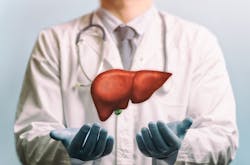Research may speed identification of patients who need liver transplants
Research findings from Rutgers, the University of Michigan, the University of Texas Southwestern, and the Medical University of South Carolina could save lives by enabling faster and more accurate identification of hospitalized patients who need liver transplants or are likely to recover.
Retrospective analysis of blood samples and medical records from 270 patients admitted to the hospital with acute liver failure (ALF) found that concentrations of a short-lived but abundant serum protein called carbamoyl phosphate synthetase 1 (CPS1) helped predict which patients survive or die without a transplant.
The same team of researchers has systemically established CPS1’s potential as such a tool. Their previous work has shown that the protein only reaches the blood when acute hepatotoxicants damage CPS1-rich liver cells.
Previous studies also show that the protein has a short half-life. If the liver starts recovering and cell death slows down or stops — a strong indication that a patient will survive without a transplant — blood-borne CPS1 decreases within hours.
In the latest study, researchers reviewed records and samples from 103 patients with acetaminophen-induced liver failure and 167 with liver failure from other causes. Patients from the first group who received liver transplants or died within 21 days of hospitalization had, on average, about twice as much CPS1 in the blood as those who spontaneously recovered. Patients from the second group who died or received transplants also had higher CPS1 levels than those who recovered, about a third higher, but the researchers calculated an 11 percent chance that this was a coincidence.
Notably, an increase of CPS1 when comparing day 3 with day 1 of hospitalization, but not other liver enzymes that normally indicate injury, was found in a higher percentage of patients with acetaminophen-induced ALF who died or required liver transplantation.

